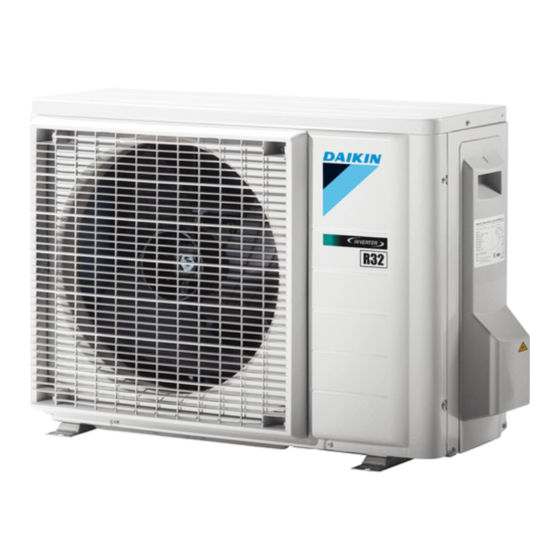Daikin 4MWXM A9 Series Installationshandbuch - Seite 11
Blättern Sie online oder laden Sie pdf Installationshandbuch für Klimagerät Daikin 4MWXM A9 Series herunter. Daikin 4MWXM A9 Series 20 Seiten.

WARNING
The appliance shall be stored so as to prevent mechanical
damage and in a well-ventilated room without continuously
operating ignition sources (e.g. open flames, an operating
gas appliance, or an operating electric heater). The room
size shall be as specified in the General safety precaution.
WARNING
▪ Do NOT pierce or burn refrigerant cycle parts.
▪ Do NOT use cleaning materials or means to accelerate
the defrosting process other than those recommended
by the manufacturer.
▪ Be aware that the refrigerant inside the system is
odourless.
WARNING
NEVER directly touch any accidental leaking refrigerant.
This could result in severe wounds caused by frostbite.
NOTICE
Applicable legislation on fluorinated greenhouse gases
requires that the refrigerant charge of the unit is indicated
both in weight and CO
2
Formula to calculate the quantity in CO
tonnes: GWP value of the refrigerant × total refrigerant
charge [in kg]/1000
Contact your installer for more information.
6.2
To determine the additional
refrigerant amount
If the total liquid
piping length is...
≤30 m
Do NOT add additional refrigerant.
>30 m
R=(total length (m) of liquid piping–
30 m)×0.020
R=Additional charge (kg) (rounded in units
of 0.1 kg)
INFORMATION
Piping length is the one-way length of liquid piping.
▪ Maximum allowable refrigerant charge amount: 2.6 kg
6.3
To determine the complete
recharge amount
INFORMATION
If a complete recharge is necessary, the total refrigerant
charge is: the factory refrigerant charge (see unit name
plate) + the determined additional amount.
6.4
To charge additional refrigerant
WARNING
▪ Only use R32 as refrigerant. Other substances may
cause explosions and accidents.
▪ R32 contains fluorinated greenhouse gases. Its global
warming potential (GWP) value is 675. Do NOT vent
these gases into the atmosphere.
▪ When charging refrigerant, ALWAYS use protective
gloves and safety glasses.
4MWXM-A9
R32 Split series
3P600450-7T – 2022.09
equivalent.
equivalent
2
Then...
Prerequisite: Before charging refrigerant, make sure the refrigerant
piping is connected and checked (leak test and vacuum drying).
1 Connect the refrigerant cylinder to the service port.
2 Charge the additional refrigerant amount.
3 Open the gas stop valve.
6.5
To fix the fluorinated greenhouse
gases label
1 Fill in the label as follows:
Contains fluorinated greenhouse gases
RXXX
1
=
f
GWP: XXX
2
=
2
1
1
+
2
=
GWP × kg
=
1000
a
If a multilingual fluorinated greenhouse gases label is
delivered with the unit (see accessories), peel off the
applicable language and stick it on top of a.
b
Factory refrigerant charge: see unit name plate
c
Additional refrigerant amount charged
d
Total refrigerant charge
e
Quantity of fluorinated greenhouse gases of the total
refrigerant charge expressed as tonnes CO
f
GWP = Global Warming Potential
NOTICE
Applicable legislation on fluorinated greenhouse gases
requires that the refrigerant charge of the unit is indicated
both in weight and CO
2
Formula to calculate the quantity in CO
tonnes: GWP value of the refrigerant × total refrigerant
charge [in kg] / 1000
Use the GWP value mentioned on the refrigerant charge
label.
2 Fix the label on the inside of the outdoor unit near the gas and
liquid stop valves.
6.6
To check for refrigerant leaks after
charging
INFORMATION
Applicable ONLY for combination with indoor units CVXM-
A9, FVXM-A9.
All field made refrigerant joints must be tested for tightness.
No leak shall be detected with a test method that has a sensitivity of
5 grams refrigerant per year or better, at a pressure of at least
0.25 times the maximum working pressure (see "PS High" on the
unit name plate).
In case a leak is detected, recover the refrigerant and repair the
joint(s).
Then:
▪ perform the leak tests see
▪ charge refrigerant.
▪ check for refrigerant leaks after charging (see above).
7
Electrical installation
DANGER: RISK OF ELECTROCUTION
7 Electrical installation
a
kg
b
kg
c
kg
d
e
tCO
eq
2
equivalent.
2
equivalent.
equivalent
2
leaks" [ 4 10].
"5.3.1 To check for
Installation manual
11
